Russian propaganda for the “Ukrainian scenario” in Macedonia (2016-2017)
During 2016 and 2017 Macedonian and Russian propagandists simultaneously promote conspiracy theories about the “Ukrainian scenario” in order to sabotage the resolution of the political crisis, the work of the SPO, the non-violent Colorful Revolution and the Pržino Agreement, as well as to justify attempts to forcibly retain power after the 2016 elections
Author: Žarko Trajanoski, media analyst
In the first part of the analysis of Russian propaganda during the Macedonian political crisis (2015-2017) we pointed out that the terms “Ukrainian scenario”, “colored revolution” and “Macedonian Maidan” were an integral part of the main propaganda messages of a communication strategy, which are realized on several propaganda channels in 2015.
The sowing of fear for the “Ukrainian scenario” continued in 2016, especially after the deepening of the political crisis on 12 April 2016, when President Gjorge Ivanov decided to pardon 56 people, which provoked civil protests throughout Macedonia. Ivanov’s spin speech, which emphasized the expressions “This is someone else’s game”, “This is someone else’s interest”, masked the personal and party interest from the decision to stop the proceedings of the Special Public Prosecutor’s Office, which indicated that “the wiretapping was performed in Macedonia, with the equipment of the UBK at the Ministry of Interior, which was then deliberate and in order not to reveal the traces “.
Moscow: Activation of the “Ukrainian scenario”
Immediately after the protests that followed the reaction to the collective pardon of politicians suspected of corruption, unauthorized wiretapping and election fraud, Moscow came out and warned of a “Ukrainian scenario” of a coup d’etat from outside:
Activation of the “Ukrainian scenario”, external inspiration of illegal actions and coups can lead to serious quakes in Macedonia, as well as destabilization of the entire Balkan region. (MFA Russia with a comment on the latest developments in Macedonia, RUSSIAN SPEECH IN MACEDONIAN, APRIL 14, 2016).
The authorities in Macedonia were explicitly on the same line with Moscow, arguing that “major foreign services are behind the ‘Ukrainian’ scenario in Macedonia” (Moscow vs. Brussels and Washington in the Macedonian crisis, April 15 2016). Causing a feeling of danger to Macedonia from foreign influences, Ivanov fiercely attacked the SPO, without giving a specific answer as to how he found out about the pardoned persons, whose names are not publically announced.
On Russian propaganda channels, protests after Ivanov’s collective pardon were used to accuse the United States of wanting to destabilize Macedonia with a “second hybrid war” and turn Skopje into a “Balkan Kyiv” (THE US WANTS TO TURN SKOPJE INTO THE BALKAN KIEV, 15.4.2016).
In an interview with the pro-government media “Dnevnik”, the Russian Ambassador to Macedonia Oleg Shcherbak received an explicit question about the inadmissibility of the “Ukrainian scenario” as one of Moscow’s key theses. Speaking about Ukraine, alluding to Macedonia, the Russian ambassador reminded that “street democracy” aimed at the violent overthrow of the legally elected government led to a complete economic and financial collapse, a civil war with thousands of victims, poverty, corruption, divisions and the loss of Ukraine’s sovereignty, which is run by the West. Shcherbak warned that any attempt at external pressure by openly manipulating civil society could lead to catastrophic consequences, as in the aforementioned tragedy in Ukraine.
Gruevski: While I stand, I will not allow a Ukrainian scenario in Macedonia
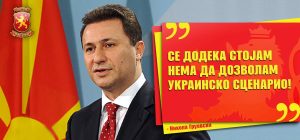
Along with the “concerns” of Moscow and Ivanov, the most-watched Macedonian pro-government media began to propagandistically exploit the topic of the “Ukrainian scenario” to delegitimize the opposition protests (Zaev tonight announced a Ukrainian scenario for Macedonia – Hooligans on the street started with realization, Sitel 14 April 2016).
The most-watched TV “Sitel” manipulatively claimed that the leader of the opposition Zoran Zaev, “when asked by the journalist ‘Is a Ukrainian scenario possible in Macedonia?’, answered that it is ‘absolutely possible”. But, the journalist of “Telma” asks: “Did Ivanov lay the foundations for the Ukrainian scenario in Macedonia yesterday?”, and Zaev in an interview for “Top-tema”, a programme on “Telma TV” from April 13, 2016, answered: “Well, it can be put that way. He laid serious foundations for a Ukrainian scenario in Macedonia as well.”
The media accusations of a “Ukrainian scenario” were a propaganda spin, twisting a single sentence by Zaev as a comment on Ivanov’s abolition, which was used to reinforce the narrative of a “Ukrainian scenario”, which had already been widely exploited by the VMRO-DPMNE party and pro-government media.
On April 14, 2016, Prime Minister Nikola Gruevski at a news conference blamed opposition leader Zaev for “mentioning that the country’s facing a ‘Ukrainian scenario’”, which, according to Gruevski, “means thousands dead and injured, a dizzying economic downturn and other dire consequences”. Several media conveyed the key propaganda message of Gruevski – “While I stand I will not allow a Ukrainian scenario in Macedonia.”
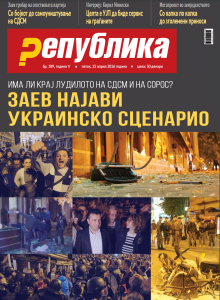
The same day, an association of defenders (war veterans from the 2001 conflict) sent a propaganda message that “they will not allow the Ukrainian scenario of SDSM”, and the propaganda attack continued in the following days by attributing a “Ukrainian scenario” to SDSM and Zaev. At a protest in front of SDSM headquarters, organized by the pro-government movement GDOM, a message was sent that they would not allow a “Ukrainian scenario” (“scenario for destabilization of the state and a coup d’etat”), as well as a request to the Constitutional Court to temporarily ban the work of every association and foundation. The pro-government movement GDOM continued with protests calling for elections on June 5, 2016, to prevent a “Ukrainian scenario” in Macedonia.
The protests were provoked by the West, and Ivanov prevented a “Ukrainian scenario”
Russian propaganda media tried to delegitimize the opposition protests after Ivanov’s collective pardon labeling them as “provoked by the US and the EU”, and as a result of Macedonia’s refusal to join the sanctions against Russia. The site “EU vs Disinfo” pointed to this disinformation, explaining that the eruption of the protests was the result of a general pardon by Ivanov of 56 people linked to the wiretapping scandal and that the EU was involved as a mediator between the parties.
Pro-government propagandists began defending Ivanov’s decision, claiming it had thwarted a second coup attempt and a Ukrainian scenario in Macedonia, citing Russian propagandists who warned of “Washington and its subordinate Brussels’ intentions to provoke a bloody civil war in Macedonia following the example of the Ukrainian scenario” (Ivanov’s decision prevented the second coup attempt – Greeks cheer for puppet Zaev, April 15, 2016).
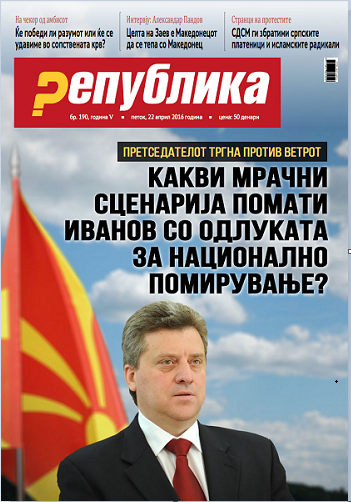
Such propaganda disinformation with a “Ukrainian scenario” provoked reactions not only from domestic journalists and analysts but also from humorists. A well-known columnist mocked the hypocrisy of the president and the leader of the ruling party, who “won the election with full mouth EU” and “do not boast that we will meet Russian standards”, and now speak of a “Ukrainian scenario”. “If they do not want a ‘Ukrainian scenario’, then why are they protesting?”, the columnist asked lucidly. Another analyst accused that “Ivanov is forcibly pushing Macedonia into the Ukrainian scenario”, that the destabilizing factor is the pardoned criminals from VMRO-DPMNE and Ivanov, and that “they are the ones who provoke Maidan in the middle of Skopje” (Ivanov and Gruevski have all the responsibility for a possible Ukrainian scenario, 16.4.2016).
The harmony of Macedonian and Russian propagandists for “Ukrainian scenario”
The answer to the question “Is Macedonia following the path of Ukraine?” was affirmative for the Macedonian pro-government propagandists, who tried to present the non-violent Colorful Revolution as a “pale copy of the Ukrainian scenario” and accused Zaev of “laying the foundations of the Ukrainian scenario in Macedonia” (Alfa, May 27, 2016).
Without presenting evidence, pro-government propagandists claimed that “the day of Molotov cocktails and excavators rushing to the institutions is not far off” and that “the frightening scenes from Ukraine, one by one, are reflected in the violent protests in Skopje” (Ukrainian scenario in Macedonia – performance by Zaev, Kurir, 27.5.2016). Without any basis, pro-government propagandists tried to present that the protesters in Skopje were “imported” and that they used the same weapons as in Kyiv, comparing a photo of throwing a “Molotov cocktail” and throwing paint with a “fork”. (See the analysis “There is no Ukrainian, but a Balkan scenario written by corrupt leaders”).
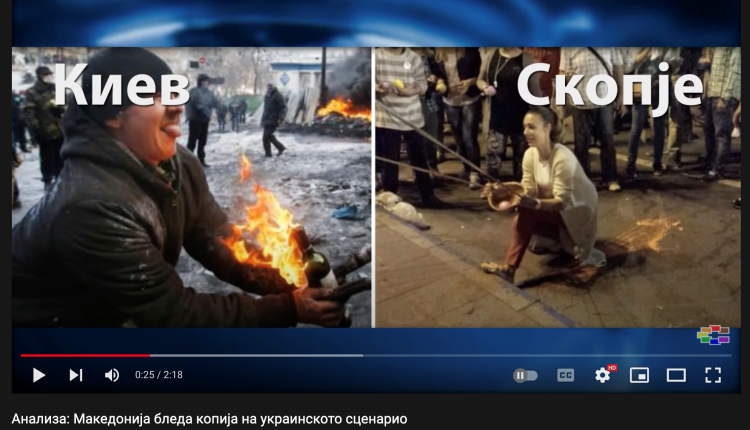
Print screen from the TV “analysis” of the then pro-government “Sitel” from May 27, 2016.One propagandist even insinuates a “Ukrainian scenario” (in the sense of deliberately killing protesters with bullets in the back) to increase tensions, pointing out that “the path from a peaceful protest by throwing paint in the fountain under the Warrior on a Horse to real blood on the streets of Skopje or Bitola is small.” (SDSM twinned Serbian mercenaries and Islamic radicals, Republika, 22.4.2016, p. 19).
Another propagandist and conspiracy theorist exposed the networks that color Macedonia and made unsubstantiated claims that “wiretapping in Macedonia is the work of the British services”, as well as the “internationalization of the Maidan scenario” which was carried out “with war attacks on institutions”.
Russian propaganda channels have strengthened domestic anti-Western conspiracy theorists against the “colored revolution” and the “Ukrainian scenario” carried out by George Soros, who “wants to destroy Macedonia, its name, language and identity.” Russia’s propaganda campaign against Macedonia in April 2016 continued to target mainly the United States as a destabilizing factor in the Balkans, as an illegal eavesdropper in Macedonia seeking to turn Skopje into a Balkan Kyiv to sabotage Russia’s “multipolar projects” and China in the region. Despite all these accusations, the United States was accused of having a plan to “internationalize the Macedonian crisis.” On the other hand, Russian propagandists openly praised the applied strategies and tactics – GDOM counter-protests, claiming that “VMRO-DPMNE is ingeniously dealing with the Colored Revolution.”
This Manichaean “black and white” framing was also noticeable in the propaganda articles of the pro-government media, which tried to delegitimize the Colorful Revolution as a “mercenary revolution”, and its participants as “mercenaries” whose sole purpose was to “Ukrainian scenario” violently taking power in the state.
Harmony of Macedonian and Russian official politicians on “Ukrainian scenario”
The propaganda that the non-violent protests of the Colorful Revolution are an integral part of a violent scenario was reinforced by President Ivanov himself, who after the mass protests first withdrew the decision to pardon the 22 most exposed politicians, and on June 6 to all other pardoned people. In an interview with the pro-government Dnevnik (which no longer exists), President Ivanov then accused Zaev of announcing a “Ukrainian scenario” and threatening violence:
I am not the one who announced a Ukrainian scenario in Macedonia. I am not the one who compared the situation in Macedonia with the situation in Syria. Zaev was the one who did that, he threatened with violence.
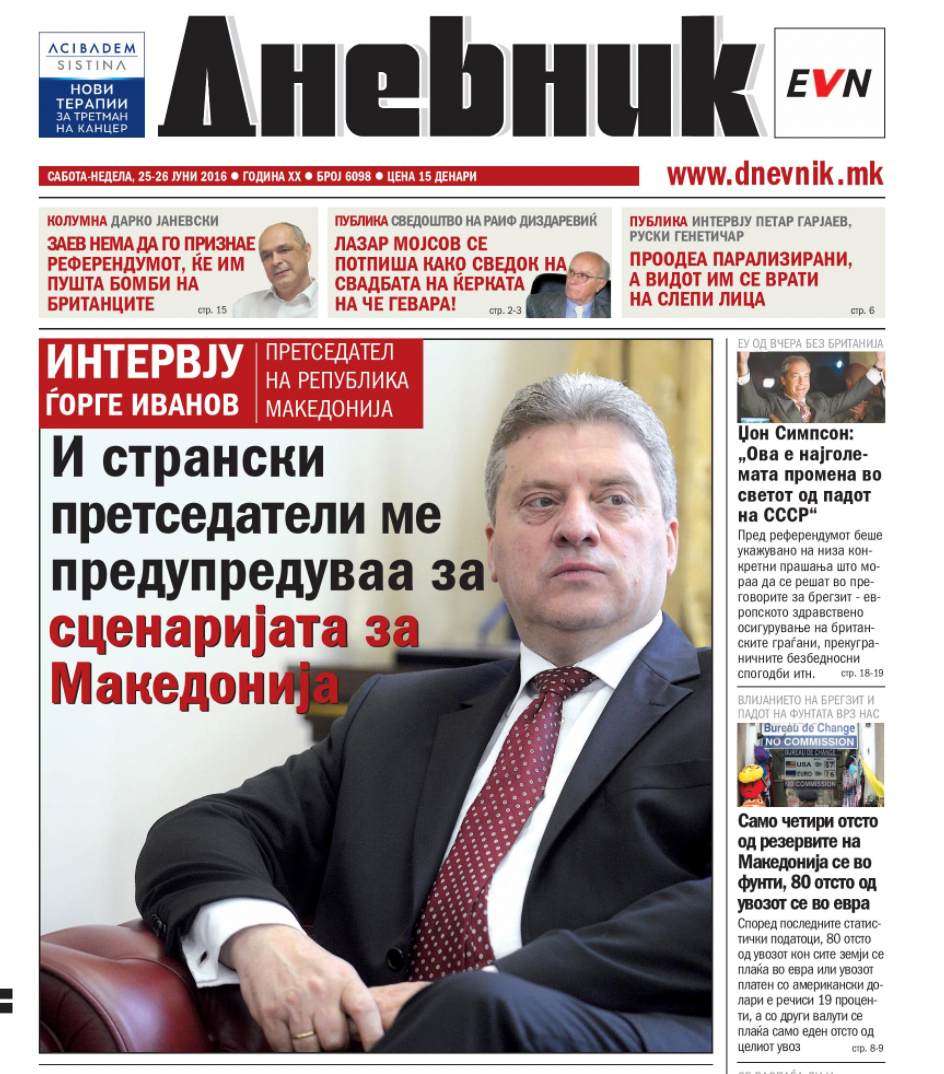
During the period of political negotiations for the peaceful overcoming of the political crisis mediated by the EU, Moscow has repeatedly accused that it is preparing the ground for provoking a new “colored revolution” in Macedonia (Zakharova: A “colored revolution” is being prepared for Macedonia).
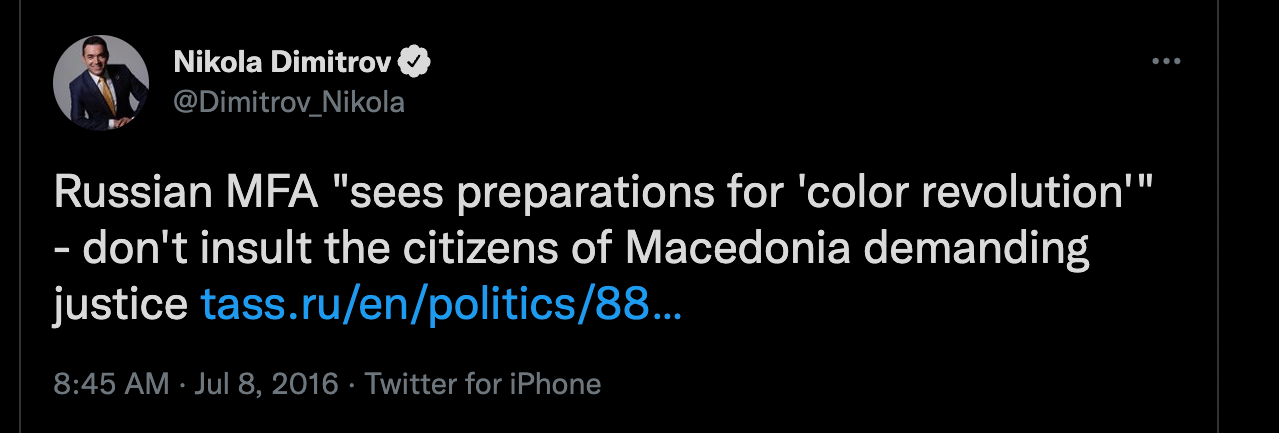
With the return of the propaganda story of a “colored revolution”, Moscow openly sided with Gruevski, once again underestimating the Macedonian citizens who have been seeking justice in the streets for months after Ivanov’s abolition.
However, despite the propaganda announcements of a violent “Ukrainian scenario” and preparations for a new “colored revolution”, the four largest political parties reached an agreement on holding peaceful elections on December 11, 2016, which was published on the website of the EU Delegation to Macedonia.
The “Ukrainian scenario” after the peaceful elections on December 11, 2016
Contrary to gloomy predictions that the ground was being prepared for a new “colored revolution”, Moscow described the December 11, 2016, parliamentary elections as peaceful, said none of the parties had won an absolute majority and called on all political forces in the country to “respect the will of the voters, to act within the framework of the Constitution, not to allow counterproductive external influence on the process of forming the new government ”.
However, after it became clear that Gruevski could not form a new parliamentary majority, Moscow changed the banner that neither party had won an absolute majority. It started talking again about “foreign influence” and “foreign interference” by the West, about “the use of destructive methods of ‘colored revolutions”, and unjustifiably claiming that Gruevski’s party won the elections – “the ruling party won a majority of the votes, and the opposition, despite all the manipulations and the undisguised support of the EU and the US, suffered a defeat.”
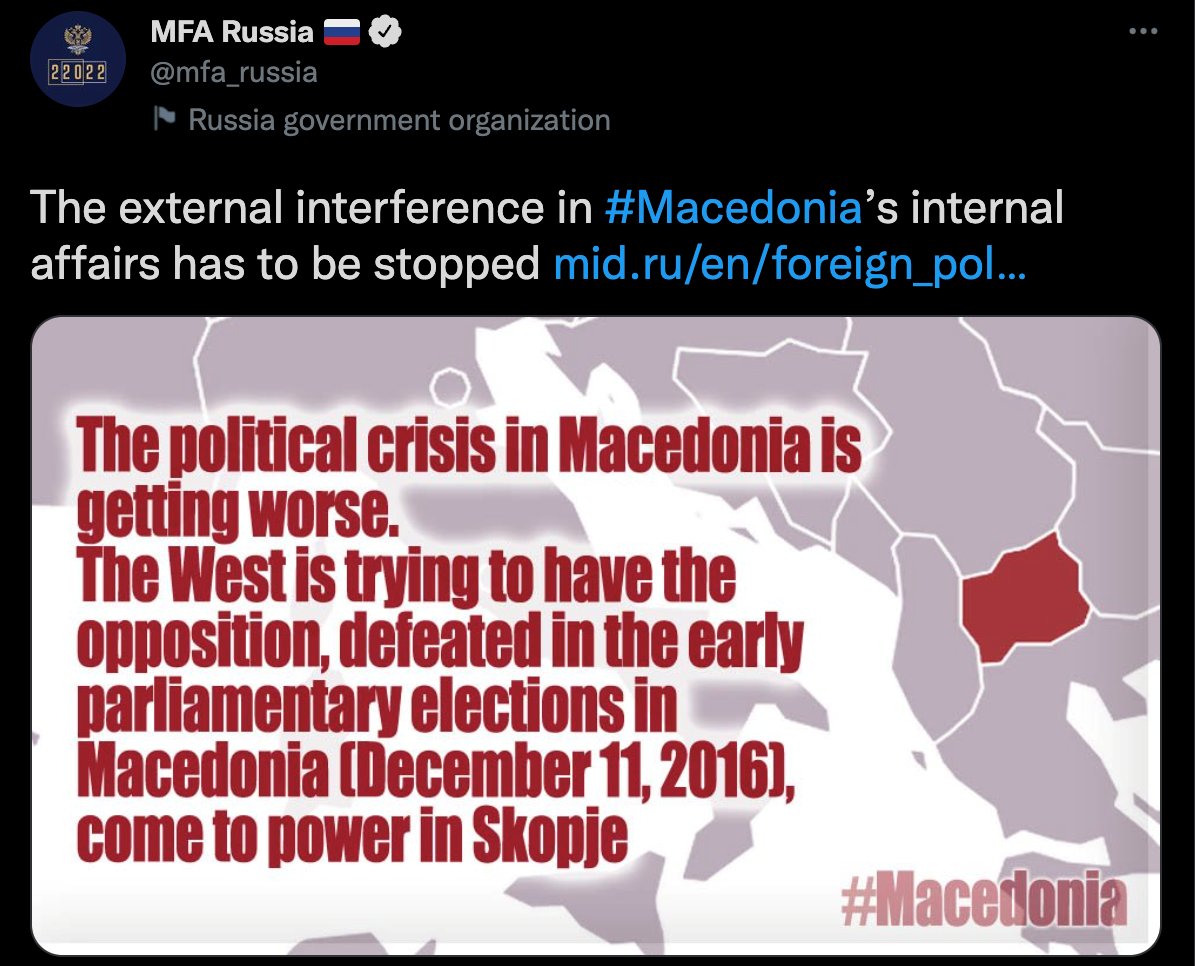
Along with Moscow, the ruling party has put the ‘Ukrainian scenario’ back into play after the “SPO dropped the Coup case for lack of evidence.” A VMRO-DPMNE spokesman described the cancellation of the Coup case as “a clear step by the SPO to protect criminals who advocated civil war, Ukrainian scenarios and bloodshed,” and announced that the people were rising up against redefining the state with “the Tirana platform”. As pro-government protesters protested against the “tyrannical platform”, and Gruevski used almost the same words – “Ukrainian scenario, civil war and bloodshed were advocated” – in an interview with the Serbian “Telegraph” (WE DO NOT WANT AN UKRANIAN SCENARIO, BUT WE WILL NOT SLEEP WHILE THEY ARE DESTROYING THE COUNTRY: Gruevski’s interview for the Serbian Telegraph!, March 10, 2017). Opposition spokesmen said “Macedonia will not be allowed to turn into Ukraine” .
The same rhetoric of Gruevski against the so-called Ukrainian scenario (attempt by foreign services to overthrow a legally elected government) was also accepted by the protest movement “For a Common Macedonia”, which opposed the “tyrannical platform”, bilingualism, federalization and direct foreign interference in Macedonia, especially by Soros.
2017: Violence by pro-government protesters instead of opposition “Ukrainian scenario”
As early as March, it was clear to analysts that the views of the Russian Foreign Ministry coincided with the views of VMRO-DPMNE, which presented the Colorful Revolution as a “Ukrainian scenario” for the overthrow of the government in Macedonia.
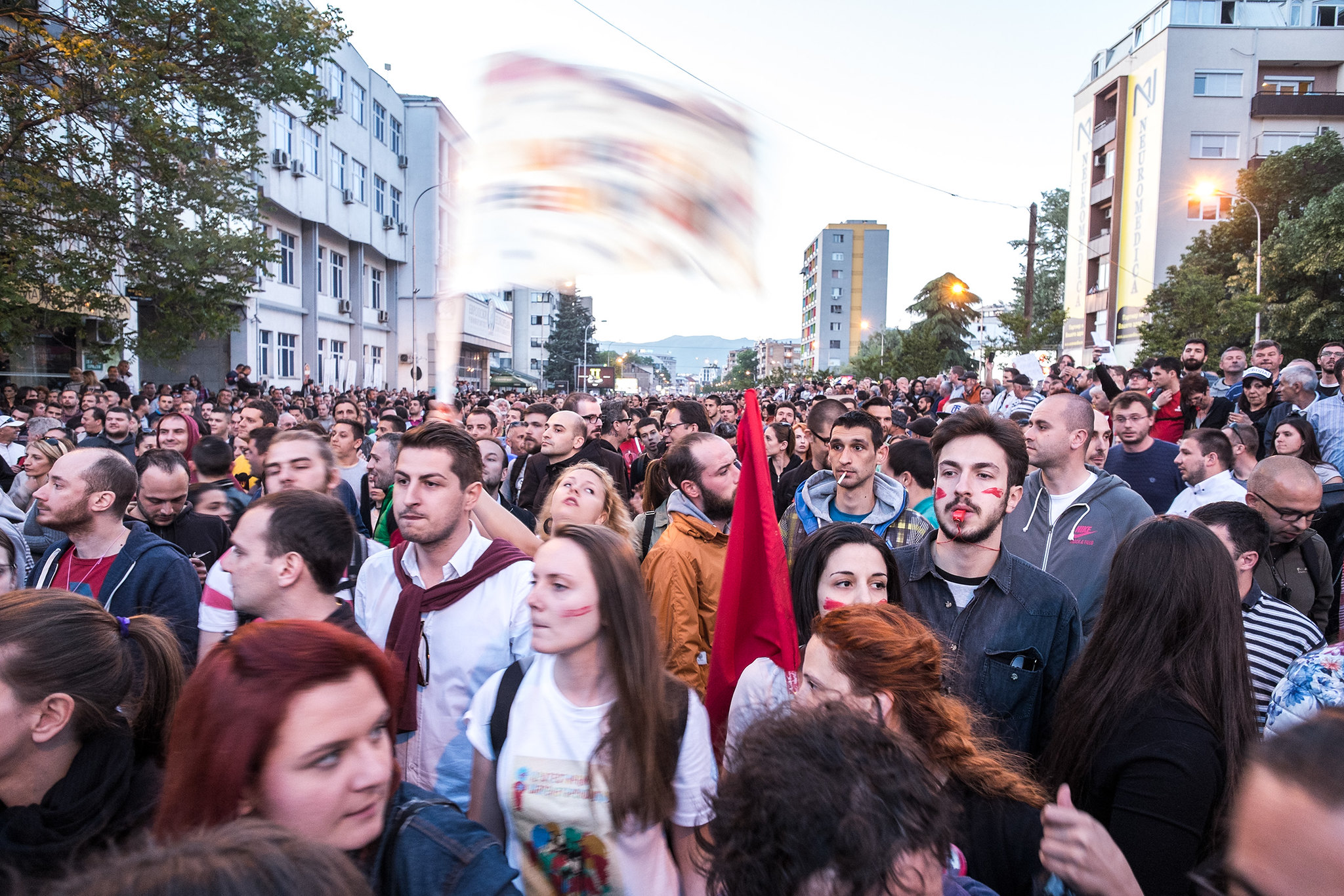
But in the spring of 2017, the government was not forcibly overthrown by any “Ukrainian scenario”. Violence as a method was used by pro-government protesters on April 27 to prevent a democratic change of government by the newly formed parliamentary majority.
During that period, Russian propagandists did not stop talking about the “Ukrainian scenario”. The Russian propaganda machine accused NATO of wanting to see “blood on the streets of Macedonia” over the “Greater Albania” project, sowed fear of the country’s disintegration and sent a message that it was time for Macedonia to “trust Russia, not Trump”. Spreading photos of the mass pro-government protests, Russia’s Sputnik even claimed not only that Brussels had been defeated in Macedonia, but that the whole of Eastern Europe was turning its eyes from the EU to Russia.
In the wake of the April 27 violence by pro-government protesters backed by Russia, Moscow accused the opposition of trying to seize power by force and that this had been planned in advance. Making unfounded comparisons with Ukraine, Russian propaganda has spread disinformation that protesters in parliament were unarmed and wanted to prevent a coup, accusing Washington and Brussels of double standards. Russian propagandists have spread disinformation that the new parliamentary majority cannot enter parliament, as well as conspiracy theories that the “Albanianization” of the Balkans was supported by EU officials. Playing the card of “Greater Albania” and the “Tirana Platform”, Russian propaganda again tried to draw parallels between Ukraine and Macedonia. However, even pro-Russian analysts who see Macedonia integrated into the “Serbian world” (“a form of integration between Serbia, Montenegro, Republiка Srpska, and Macedonia”) have begun to see fundamental differences between Macedonia and Ukraine.
Even after the violence on April 27, the Macedonian propagandists tried to interpret the events with conspiracy theories, using again the propaganda phrase “Ukrainian scenario”, which was allegedly exposed and prevented by VMRO-DPMNE.
The exploitation of the fear of Ukrainianization of Macedonia
Official Moscow and its propaganda machine made the most of the political crisis in Macedonia (2015-2017) to attack Washington and Brussels, sowing fear of a “bloody Ukrainian scenario” in a bid to reduce the Western influence in Macedonia and the Balkans. After Ivanov gave the mandate to Zaev and it was clear that the new parliamentary majority would form a government, Russian propagandists continued to accuse the United States of not resolving the Macedonian crisis, but of exacerbating it and endangering the Balkans. Russia has maximally exploited the fear of the Ukranianization of Macedonia in order to weaken the West and strengthen its interests in Macedonia and the Balkans.
Although official Moscow defended the violent protesters and corrupt politicians who violated the constitution and obstructed the democratic procedures for change of government, on May 24, 2017, Putin wished Ivanov the development of the internal political situation in accordance with the Constitution and the democratic procedure.
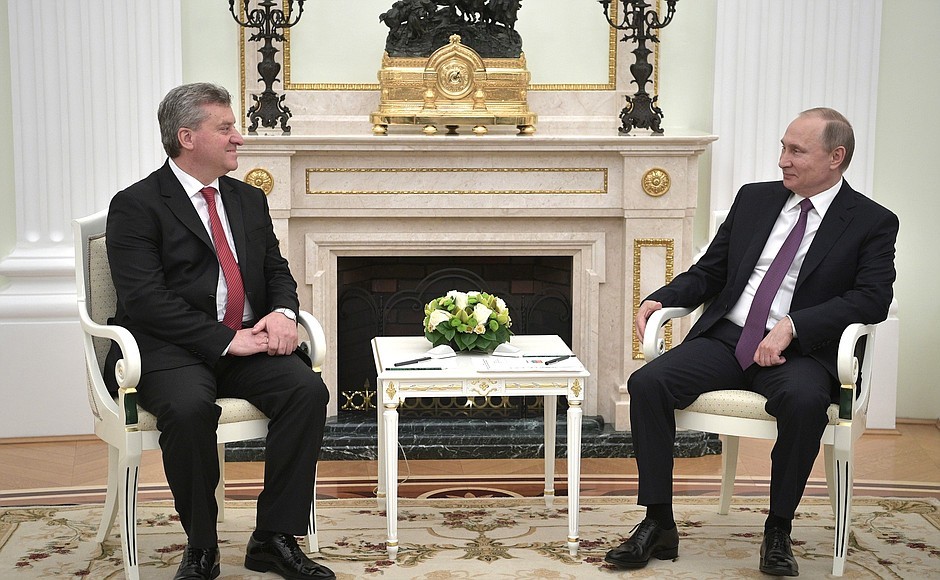
On the Day of Slavic Literacy, Putin congratulated Ivanov on the award for strengthening inter-Orthodox relations, given by the International Social Foundation for the Unity of Orthodox Peoples, and presented personally by the Russian Patriarch.
All comments and remarks regarding this and other Vistinomer articles, correction and clarification requests as well as suggestions for fact-checking politicians’ statements and political parties’ promises can be submitted by using this form
